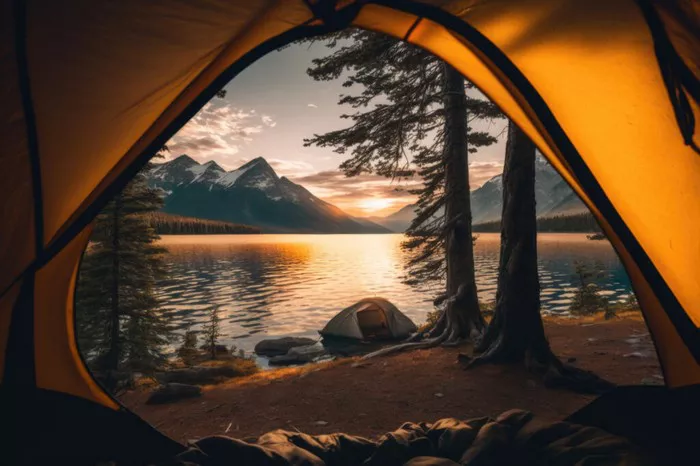Camping in a tent is a cherished outdoor activity enjoyed by millions worldwide. The allure of sleeping under the stars, surrounded by nature’s tranquility, is undeniable. However, amidst the serenity of the wilderness, concerns about safety often arise. From encounters with wildlife to inclement weather conditions, understanding the risks and taking necessary precautions are paramount for a safe and enjoyable camping experience.
Understanding the Risks
Before embarking on a camping trip, it’s essential to be aware of potential risks associated with tent camping. While camping is generally safe, several factors can pose hazards:
1. Wildlife Encounters: Depending on the location, campers may encounter various wildlife, including bears, snakes, or insects. Improper food storage or inadvertent attraction of animals can increase the risk of dangerous encounters.
2. Weather Conditions: Mother Nature is unpredictable, and campers may face adverse weather conditions such as thunderstorms, heavy rain, or extreme temperatures. Exposure to extreme weather without proper gear can lead to hypothermia, heatstroke, or other weather-related illnesses.
3. Terrain and Hazards: Campsites may have uneven terrain, hidden obstacles, or natural hazards like falling branches or unstable ground, increasing the risk of accidents or injuries.
4. Human Factors: Campgrounds can attract a variety of people, and interactions with other campers or strangers may sometimes lead to conflicts or safety concerns.
Mitigating Risks
While camping involves inherent risks, proper preparation and precautions can significantly mitigate these risks, ensuring a safer outdoor experience:
1. Choose a Suitable Campsite: Select a campsite that is safe and well-maintained. Look for level ground, away from potential hazards like cliffs, unstable rocks, or dead trees. Additionally, consider proximity to water sources and potential flooding risks.
2. Wildlife Awareness and Prevention: Research the local wildlife and learn how to minimize the risk of encounters. Store food securely in bear-proof containers or hung from trees at a safe distance from the campsite. Avoid leaving food scraps or strong-smelling items in or around the tent.
3. Weather Preparedness: Check the weather forecast before your trip and pack appropriate clothing and gear for the expected conditions. Bring a sturdy tent designed to withstand wind and rain, along with extra tarps or a footprint to protect against moisture. In case of severe weather, have a backup plan and be prepared to seek shelter if necessary.
4. Safety Equipment: Pack essential safety equipment, including a first aid kit, flashlight or headlamp, emergency whistle, and multipurpose tool. Consider carrying a portable weather radio or satellite phone for communication in remote areas.
5. Campfire Safety: If allowed, practice proper campfire safety by keeping fires contained in designated fire rings or pits. Never leave a fire unattended, and ensure it is fully extinguished before leaving the campsite or going to sleep.
6. Emergency Preparedness: Familiarize yourself with the location of emergency services, medical facilities, and evacuation routes. Share your itinerary with a trusted friend or family member and establish check-in times if venturing into remote areas with limited communication.
7. Responsible Behavior: Practice Leave No Trace principles by minimizing your impact on the environment and respecting wildlife and other campers. Dispose of waste properly, follow campground rules, and avoid excessive noise that may disturb wildlife or fellow campers.
Benefits of Tent Camping
Despite the potential risks, the benefits of tent camping are numerous and often outweigh the concerns:
1. Connection with Nature: Camping offers a unique opportunity to disconnect from the hustle and bustle of daily life and immerse oneself in the natural world. The sights, sounds, and smells of the wilderness can rejuvenate the mind and body, promoting relaxation and mental well-being.
2. Affordability and Accessibility: Compared to other forms of travel or accommodation, camping is often more affordable and accessible to people of all ages and backgrounds. With a modest investment in gear and supplies, campers can enjoy countless outdoor adventures close to home or in remote wilderness areas.
3. Outdoor Recreation: Camping provides a gateway to a wide range of outdoor recreational activities, including hiking, fishing, birdwatching, stargazing, and photography. Whether seeking adrenaline-pumping adventures or tranquil moments of solitude, there’s something for everyone to enjoy in the great outdoors.
4. Social Bonding: Camping offers opportunities for social bonding and shared experiences with friends, family, or fellow outdoor enthusiasts. Gathering around a campfire, sharing stories, and experiencing the beauty of nature together can strengthen relationships and create lasting memories.
5. Self-Reliance and Skills Development: Camping fosters self-reliance, problem-solving skills, and resourcefulness as campers learn to adapt to changing conditions and overcome challenges in the wilderness. From setting up camp to cooking meals outdoors, camping encourages independence and resilience.
Conclusion
While camping in a tent entails certain risks, proper preparation, and responsible behavior can greatly enhance safety and ensure a memorable outdoor experience. By understanding potential hazards, taking necessary precautions, and embracing the benefits of tent camping, adventurers can embark on exciting journeys into the wilderness with confidence and peace of mind. So, pack your gear, pitch your tent, and immerse yourself in the beauty of nature – the great outdoors awaits!

